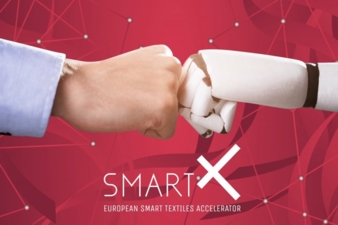12.10.21 – Promising innovative projects
SmartX Europe mobilises the European smart textile industry
SmartX Europe has completed three funding calls aimed at textile start-ups and small businesses (SMEs) in the European Union and affiliated countries.
SmartX is operated by a consortium of 13 partners across Europe from various industries, including textile manufacturing technology, microelectronics, data processing, and IoT.
25 innovative projects from a total of 50 European SMEs, selected by a committee of external experts from the textile and electronic industries, will receive funding in the amount of 60,000 euro per project and one year of free expert coaching. The remarkable support capacity of 2.4 million euro comes from the European Union’s Horizon 2020 research and innovation programme, under grant agreement No. 824825. The main goal of the ambitious 3-year programme that began in 2019 is to accelerate the development of promising prototypes and their successful introduction to end markets.
“According to studies, the global market for smart textiles and wearables is entering a rapid growth phase, expected to reach $3 billion by 2024,” says Lutz Walter, Secretary General of Textile ETP, The European Technology Platform for the Future of Textiles and Clothing, one of SmartX partners and the programme coordinator. “This is why EU research authorities consider smart textile development as a top priority for the industry.”
The SmartX platform features a virtual showcase room where you can read about the funded projects and their goals, see where they are in the development process, and connect with the start-ups and SMEs who are developing them. The projects are grouped into four categories: Health, Industrial, Protection, and Sport.
Seat Mat by Sensing Tex
Among the winners in the Health category is Seat Mat by Sensing Tex, a system aimed at preventing pressure ulcers in wheelchair users. Developed by Sensing Tex, a Spanish SME developing solutions for sports, wellness and healthcare sectors, the system delivers qualitative raw data to recognise high-quality magnitudes from pressure maps by using the latest data analytics. The data is then used for tracking postural analysis of wheelchair users, detecting hotspots and recommending optimal repositioning. Based on an earlier prototype, the new Seat Mat is set to launch in Autumn 2021.
Nahtlos ECG Textile Carrier
Another healthcare-oriented solution is the Nahtlos ECG Textile Carrier, a medical electrocardiogram (ECG) solution for continuous, long-term monitoring of cardiac activity. The device consists of a ribbon carrier with clip-in electrodes based on a patented electrode structure, which results in a modular and highly flexible ECG system. The carrier can be adapted to different body shapes and sizes, and the patient can put it on and take it off by themselves. The solution is developed by Nahtlos AG from Switzerland with medical yarn provided by W. Zimmermann GmbH & Co. KG and technical ribbons from Fritz Moll Textilwerke GmbH & Co.KG (both SMEs hail from Germany).
Swemax by Biometrica
One of the winners in the sport solutions category, Swemax by Biometrica is a wearable real-time monitoring system of sweat and salt loss, based on a biosensor integrated into textile fibres. The electronic component communicates biological data in real-time to a dedicated app on the user's smartphone. Thanks to the data, it is possible to optimise hydration and salt reintegration, improving the user’s fitness condition and preparation for competitions. Designed with athletes in mind, the solution comes from Italian start-up Biometrica, in partnership with Staff Jersey (also from Italy) and Worldklaas (Belgium).
Long-term goals for the European smart textile industry
In addition to boosting smart textile innovation, SmartX partners have succeeded in building a long-term professional community, which brings together European smart textile businesses, researchers and other experts, and promotes greater interaction among them. To animate the community, SmartX has developed an online collaboration platform and hosts members-only webinars to share state-of-the-art knowledge about the key issues challenging the competitiveness of the European smart textile industries.
One of these major issues facing European smart textile innovators is the key manufacturing gaps that currently exist in the smart textile value chain. While European start-ups and SMEs are particularly well-equipped to offer customised or niche market solutions and compete in the global market, they may not reach their full potential and meet the current demand for smart textile-based solutions if the manufacturing gaps are not filled. To provide evidence of this problem and design pathways to solve it, the consortium has developed and published a new Smart Textiles Value Chain Map.
This roadmap, available as a downloadable resource on the SmartX platform, serves to mobilise and strengthen the European smart textile community. It provides an overview of the complex value chain, lists specific challenges facing the industry, and points out which issues need to be addressed.


